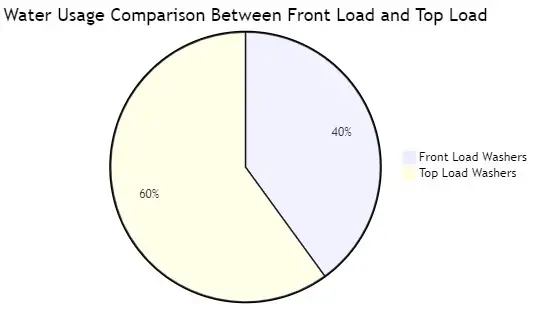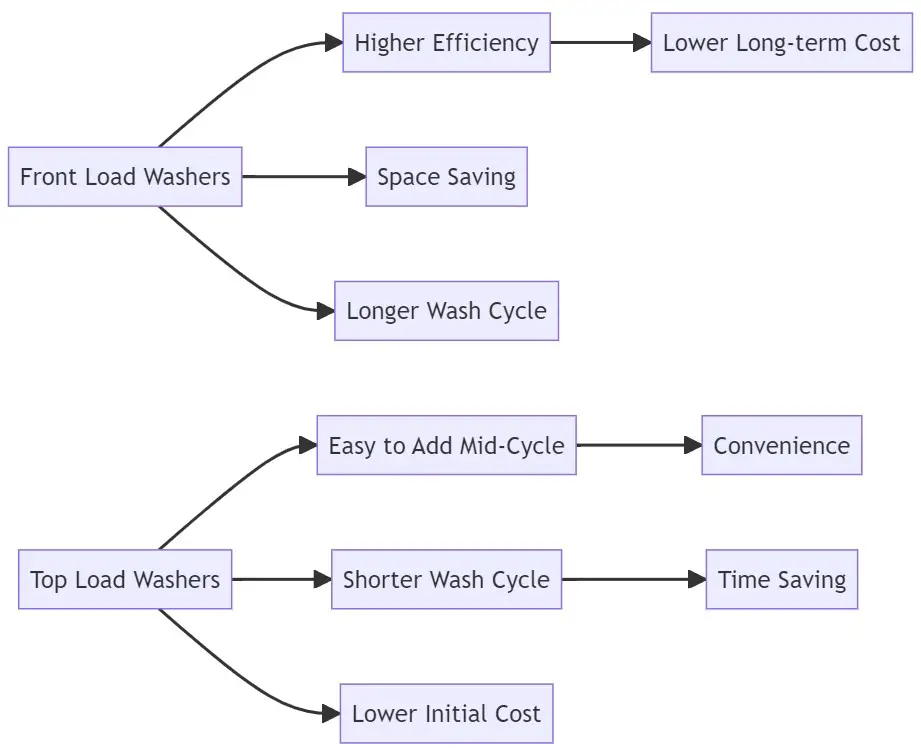The task of doing laundry may seem simple, but the appliance you choose for it can make a significant difference in your daily routine.
Selecting the right washing machine is essential for efficient and effective cleaning.
Your choice impacts not just the cleaning performance but also your water usage, energy efficiency, and ultimately, your wallet.
Table of Contents
Two Main Types of Washing Machines
When it comes to washing machines, there are primarily two types to consider: front-load washing machines and top-load washing machines.
Front-Load Washing Machines
A front-load washing machine is characterized by its horizontally aligned drum and a door at the front, which is how it gets its name.
When you use this type of machine, you’ll typically find that it’s lower to the ground and may require bending to load and unload clothes.
These machines are known for their energy efficiency and excellent cleaning performance, often incorporating advanced features like steam cleaning and various custom cycle options.
Top-Load Washing Machines
On the other hand, a top-load washing machine has a vertically aligned drum and a lid on the top.
These machines are easier to load since they sit higher off the ground, eliminating the need to bend over.
While they may not be as energy-efficient as front-loaders, they usually offer a larger capacity and are generally easier to maintain.
Both types have their unique sets of features, price ranges, and maintenance requirements, making the choice between the two not as straightforward as one might think.
The choice between a front-load and a top-load machine will ultimately depend on various factors, including your laundry habits, space constraints, and specific washing machine needs.
Key Differences
- At a glance, the key differences between the two types center around energy efficiency, water usage, cleaning performance, and capacity.
- Front-load washing machines are generally more energy-efficient and use less water but may come at a higher price and require more maintenance.
- On the other hand, top-load washing machines are typically easier to maintain and have a larger capacity but may consume more water and electricity.
Factors to Consider When Choosing a Washing Machine
Making an informed choice requires understanding various factors that differentiate one type of washing machine from another.
Let’s go through the most common of these aspects one by one.
Energy Efficiency
One of the most critical aspects to consider while choosing a washing machine is its energy efficiency.
When it comes to energy efficiency rating, front-load washing machines generally outperform top-load washing machines.
The reason for this lies in the mechanics of the wash cycle.
Front-loaders use a tumbling action to move clothes around, requiring less water and, consequently, less electricity to heat that water.
On the other hand, top-loaders typically use an agitator or impeller mechanism, which necessitates more water and more energy to heat it.
Furthermore, front-loaders usually have faster spin cycles, effectively removing more water from the clothes.
This means less time and energy required for drying, adding another layer to its energy efficiency.
Water Usage

One important thing to keep in mind is water usage.
With a growing emphasis on conserving water, the water consumption of your appliance is an aspect that warrants careful attention.
Front-load washing machines excel in this area as well.
They only fill the drum with enough water to cover the clothes, thus utilizing water more efficiently.
This is in contrast to top-load washing machines, which often fill the entire drum with water (Non-HE models), regardless of how full the machine is.
The result is a noticeable difference in water consumption between the two types, making front-loaders a more eco-friendly option.
By opting for a front-loader, you’re not just reducing your water bills but also contributing to environmental conservation, a win-win situation when considering both water usage and energy efficiency.
Cleaning Performance
The ultimate goal of any washing machine is to get your clothes clean, and in this department, cleaning performance matters a lot.
When comparing front-load washing machines to top-load washing machines, you’ll find noticeable differences in how they achieve this goal.
Front-load washing machines use a tumbling action, where clothes are lifted and then dropped into the water.
This method is generally considered to be more effective in removing dirt and stains, leading to superior cleaning performance.
Top-load washing machines, on the other hand, use either an agitator or an impeller to move clothes around.
While they are effective, they generally don’t clean as thoroughly as front-loaders.
In addition, the agitator in some top-loaders can be rough on clothes, leading to more wear and tear over time.
In short, if cleaning performance is a top priority for you, a front-load washing machine might be the better choice.
Speed: More Than Just a Number
Speed is often a decisive factor for many, especially those leading busy lives.
Top load washers typically complete cycles faster, owing to their simpler mechanics and higher RPM (revolutions per minute).
Front-load washers may take a bit longer but often deliver better cleaning results due to faster spinning speeds.
The Versatility Factor
Versatility is another crucial aspect to consider.
Front-load washers generally offer more settings and customization options, making them suitable for a variety of fabrics and washing requirements.
On the other hand, top-load washers are often more straightforward but may lack the finesse to treat different types of fabrics.
Ergonomics and Accessibility
When it comes to ease of use, top-load washers win hands down.
There’s no need to bend down to load or unload your laundry. Front-load washers may require some bending or squatting, which might not be ideal for those with mobility issues.
Capacity: How Much Can You Load?
When it comes to capacity, the amount of clothes you can fit into a single wash cycle, top-load washing machines generally have the upper hand.
While the capacity for both types can vary depending on the model, top-loaders often offer more space.
This is because their drum is typically wider and deeper, allowing for a greater load size, often ranging from 5 to 7 Kg and sometimes even more.
Front-load washing machines, although efficient in many ways, usually have a smaller capacity, typically ranging from 4 to 6 Kg.
The design constraints, mainly due to the door and the rubber seal, limit the amount of laundry that can comfortably fit into a single cycle.
Price
The price factor is often a decisive one when choosing a washing machine.
Generally speaking, front-load washing machines are more expensive upfront.
Their superior energy efficiency and cleaning performance come at a price, but these features might save you money in the long run through reduced water and electricity bills.
Top-load washing machines, on the other hand, are generally more budget-friendly initially but may cost you more in the long run due to higher water usage and electricity consumption.
Maintenance
Maintenance is another crucial aspect to consider.
Front-load washing machines require diligent maintenance to prevent issues like mold and mildew, which can accumulate around the rubber door seal.
Regular cleaning and timely washing machine repairs are essential for keeping a front loader in optimal condition.
Top-load washing machines are generally easier to maintain.
They’re less prone to mold and mildew issues and often have a lint trap that is simple to clean.
However, they may have their own set of problems like mechanical wear and tear, which would also require occasional troubleshooting and repairs.
Benefits and Drawbacks of Top-Load and Front-Load Washing Machines
To give you a comprehensive view, let’s summarize the pros and cons of front-load washing machines and the pros and cons of top-load washing machines in a straightforward table.
This will make it easier for you to decide which washing machine is right for me.
| Features | Front-Load Washing Machines | Top-Load Washing Machines |
| Energy Efficiency | High, better energy efficiency rating | Generally lower |
| Water Usage | Less water consumption | More water usage |
| Cleaning Performance | Superior | Good but generally not as effective |
| Capacity | Generally smaller (4-6 Kg) | Larger (5-7 Kg and above) |
| Price | More expensive upfront | Generally less expensive |
| Maintenance | Requires regular maintenance for mold/mildew | Easier to maintain |
| Noise Level | Generally quieter | May be noisier depending on the model |

By comparing these factors, you can make a more informed decision on how to choose a washing machine that suits your individual needs and lifestyle.
Portable Washing Machines: An Alternative Option?
While front-load and top-load washing machines dominate the market, there’s another option worth considering, especially for those with space constraints or a tighter budget: portable washing machines.
Do Portable Washing Machines Really Work?
Yes, portable washing machines are a viable alternative for smaller loads and are particularly useful for people living in apartments or homes without a dedicated laundry room.
They are generally smaller in capacity, usually ranging from 1 to 4 Kg, and are designed to be easily moved and stored.
While they may not have the same features, energy efficiency rating, or cleaning performance as their full-sized counterparts, they are surprisingly effective for what they are designed to do.
They are also generally quieter, adding less noise level to your environment.
Final Thoughts
Choosing the right washing machine is a decision that should be made carefully, considering various factors such as energy efficiency, water usage, cleaning performance, and price.
Whether you opt for a front-load washing machine or a top-load washing machine, understanding their pros and cons can make your decision-making process easier.
While front-loaders generally excel in energy efficiency and cleaning performance, they can be more expensive and require diligent maintenance.
On the flip side, top-loaders offer greater capacity and are generally easier to maintain but may consume more water and energy.
Don’t forget, if you’re short on space or on a budget, portable washing machines offer a flexible alternative, albeit with their own set of challenges and benefits.
So, when pondering the question, “Which washing machine is right for me?”, remember that there’s no one-size-fits-all answer.
Your choice should align with your specific needs, whether it’s energy efficiency, capacity, or price.
For a more detailed look, always consult washing machine reviews and washing machine buying guides to help you pick among the best washing machines available in the market.
Frequently Asked Questions
Can You Add Clothes Mid-Cycle in Front Load Washers?
While traditional front-load washers have locking doors, many modern models now offer a pause feature, allowing you to add garments mid-cycle.
Why are front-load washers more expensive?
Front-load washers are typically more expensive due to their advanced features and higher energy efficiency.
Which washing machine is best: top-load, front-load, or semi-automatic?
The “best” washing machine depends on your needs: front-load for energy efficiency, top-load for ease of use, and semi-automatic for budget-friendliness.
What size washing machine should a family of 4 use?
For a family of 4, a washing machine with a capacity of 6 to 8 kg is generally recommended.
How much laundry can a 5kg washing machine handle?
A 5kg washing machine can wash approximately 25 T-shirts or a mix of outfits including jeans, tops, and some linens.
You May Also Like
- Portable vs. Traditional Washing Machines (The Right Option)
- How does an automatic washing machine choose water level?
- Washing Machine Drawer Not Emptying? Here’s the Fix!
- Fix Your Leaking Washing Machine Drawer in 10 Minutes
- Why does corrosion often take place under metal washers?
- How to extend the lifespan of your washing machine?





